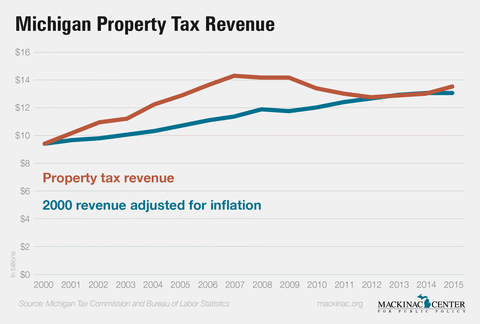Commentary
Municipal Revenues Up Despite Arguments to the Contrary
Bridge Magazine article misses the big picture
In Bridge Magazine, former state House Fiscal Agency director Mitch Bean writes:
In addition to property tax cuts, changes to the sales tax base have reduced constitutional revenue sharing payments to cities, villages and townships (CVT) by $27.3 million in FY 2014 and by $181.2 million cumulatively since Proposal A in 1994.
He is not the only one judging that the state’s local government revenue system is “broken.”
You might think this is a terrible situation that local governments find themselves in. But Bean’s numbers don’t really tell the whole story about constitutional local government revenue sharing nor property tax trends. The annual constitutional revenue sharing payment is up $134.6 million over its 2001 level and payments to local governments increased $670.1 million cumulatively since then. Constitutional revenue sharing payments continued to increase regardless of what happened to the sales tax base.
And property tax revenue increased above inflation from 2000 to 2015 as well, suggesting that there weren’t really any meaningful property tax cuts to speak of. Local property tax revenue even grew above inflation from 2000 to 2007, a period when Michigan was suffering from a one-state recession.

Bean deserves credit for pointing out the problems associated with the accumulation of retirement system debt in local governments. But blaming municipal financial struggles exclusively on nonexistent property tax cuts and inadequate constitutional revenue sharing funds misses the big picture.
|

Municipal Revenues Up Despite Arguments to the Contrary
Bridge Magazine article misses the big picture
In Bridge Magazine, former state House Fiscal Agency director Mitch Bean writes:
He is not the only one judging that the state’s local government revenue system is “broken.”
You might think this is a terrible situation that local governments find themselves in. But Bean’s numbers don’t really tell the whole story about constitutional local government revenue sharing nor property tax trends. The annual constitutional revenue sharing payment is up $134.6 million over its 2001 level and payments to local governments increased $670.1 million cumulatively since then. Constitutional revenue sharing payments continued to increase regardless of what happened to the sales tax base.
And property tax revenue increased above inflation from 2000 to 2015 as well, suggesting that there weren’t really any meaningful property tax cuts to speak of. Local property tax revenue even grew above inflation from 2000 to 2007, a period when Michigan was suffering from a one-state recession.
Bean deserves credit for pointing out the problems associated with the accumulation of retirement system debt in local governments. But blaming municipal financial struggles exclusively on nonexistent property tax cuts and inadequate constitutional revenue sharing funds misses the big picture.
Michigan Capitol Confidential is the news source produced by the Mackinac Center for Public Policy. Michigan Capitol Confidential reports with a free-market news perspective.
More From CapCon